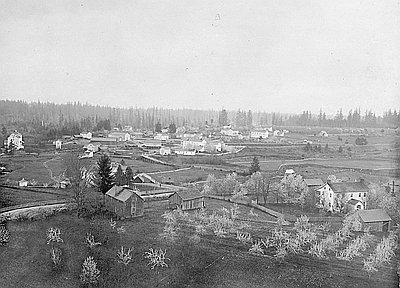- Catalog No. —
- OrHi 4508
- Date —
- circa 1875
- Era —
- 1846-1880 (Treaties, Civil War, and Immigration)
- Themes —
- Religion
- Credits —
- Oregon Historical Society
- Regions —
- Willamette Basin
- Author —
- Unknown
Wilhelm Keil
This photograph of Wilhelm (William) Keil (1812–1877) was taken sometime between 1855 and 1877. Keil was the founder of two German-speaking Christian communal societies—one in Bethel, Missouri, and the other in Aurora, Oregon.
Keil immigrated to the United States from Germany with his wife, Louise Ritter, in 1835–1836. After a short time in New York, the Keils moved to Pittsburgh, where Wilhelm opened up a pharmacy and adopted the title, “doctor,” which he used for the remainder of his life. While in Pittsburgh, Keil was swept up by the religious fervor of the Second Great Awakening, and in 1838, he served as a Methodist preacher. His criticisms of paid clergy, denominational Christianity, and institutional religion caused him to distance his congregation (in Deer Creek, Pennsylvania) from the Methodist Episcopal Church completely.
After severing his ties with the Methodists, Keil preached to his Deer Creek congregation and promoted himself as a soon-to-be-martyred herald of the Last Judgment—which like many other revivalist preachers, he predicted would happen in 1844. When Judgment Day failed to occur, Keil began organizing his congregation around a communal structure, preached to his followers to isolate themselves from a corrupt world, and then led them west, establishing the Bethel Colony in Missouri in 1844.
Although the Bethel Colony was considered a success, Keil began to lose faith in the long-term viability of the community. By 1850, some of the original settlers of the colony had withdrawn their formal memberships, but they continued to live in the community—albeit with individualistic attitudes and capitalistic interests. Keil responded by establishing a second colony in Oregon—a process that lasted from 1853, when scouts were first sent west to find a site, to early 1857, when the first twenty-five colonists relocated in Aurora, Oregon. According to Keil, “It was not the fault of the country that we undertook the journey to Oregon, but the people themselves. If the people had submitted to discipline and given heed to the voice of God it would not have been necessary to leave Bethel.” By 1863, more than 300 members of the Bethel Colony had emigrated to the Aurora Colony.
Between 1855 and 1870, six of Keil’s nine children died (one from malaria, four from smallpox, and one from scarlet fever). Although Keil was not without critics, his leadership was instrumental in the maintenance of the two colonies. After his death in 1877, both colonies were officially dissolved and land was distributed to individual families.
Further Reading:
Harris, Patrick J. “William Keil and the Aurora Colony: A Communal Society Crosses the Oregon Trail.” In Religion and Society in the American West, edited by Carl Guarneri and David Alvarez. Lanham, Md. 1987.
Duke, David Nelson. “A Profile of Religion in the Bethel-Aurora Colonies.” Oregon Historical Quarterly 92, 1991: 347–359.
Written by Joshua Binus, © Oregon Historical Society, 2006.

